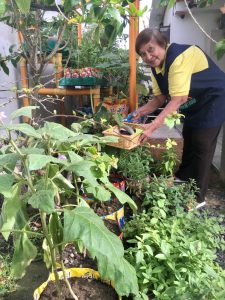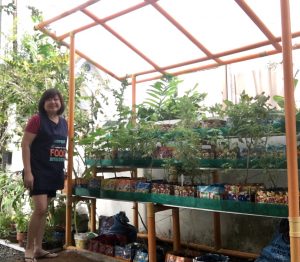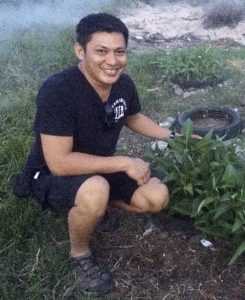
This was in response to the fact that 95 Filipino children die everyday from malnutrition and about seven million Filipino children suffer from serious malnutrition. And this was before the pandemic.
The current feeding program of the Department of Education (DepEd) is very limited and not enough to significantly address this problem. And even if they have banned “junk food” in public schools, they are not able to implement it effectively.
When we asked school principals why that is, their common response: “We do not have enough supply of affordable nutritious food to serve the students.”
And it is not just the schools that face this problem. Every person who has ever attempted to eat healthier would tell you that it is a challenge to do that in this country.

If you spend most of your time outside the house and eat at your canteen or an eatery that’s convenient, chances are, most dishes offered have little to no vegetables in them. If you can afford to eat at a restaurant, the “healthy choices” are bland salads dripping in
processed dressing. You have to seek out those little specialty vegan restaurants that are not that budget-friendly.
This is puzzling considering that Davao is the food basket of the Philippines. It supplies fresh fruits and vegetables for the rest of the country. It has an Organic Agriculture Ordinance, one of the first cities to do so.
So how come we have to search long and hard for anything fresh and organic to eat in this city?
With the coronavirus pandemic, our society’s broken systems have been exposed and their failure deeply felt by everyone. Not only is our healthcare system not capable of effectively handling a public health crisis of this magnitude, it also showed that our food production and
the delivery system does not have the capacity to feed and nourish all of us while we are in enhanced community quarantine (ECQ).
With no vaccine available and no definite cure, it looks like our only defense from the coronavirus is a healthy immune system. And what makes our immune system healthy? Nutritious food. Yes, food rich in antioxidants, vitamins and minerals. Food from our organic farms and food we can grow ourselves in our own homes. Eating healthy food will help save us from Covid-19.
Food is medicine, as Hippocrates, the father of Western medicine, said. Almost 2,500 years ago, he told us to “leave your drugs in the chemist’s pot if you can heal the patient with food.” Years of scientific research have shown us that a nutritious diet can reverse chronic diseases like diabetes, hypertension, autoimmune and heart diseases, even cancer.

So along with learning how to make our own improvised face masks and finding creative ways to prepare dishes with canned sardines as the main ingredient, growing our own food would be a good skill to develop while staying at home during ECQ.
I must admit that it took a personal health crisis before I finally got around to start my own edible garden. It needed a few trips to the intensive care unit and millions in hospital bills to get the needed motivation to finally do it.

Because I have little interest and zero skills in any type of growing anything (as proven by the cactus that died under my care), I asked the help of no less than the founder of urban container gardening in Davao, Jojo Rom, to help me set up our urban garden.
Jojo is a resource person of the Davao Food Revolution and he helped establish the rooftop garden of the Davao City Agriculture Office. He helped train our grassroots partners in urban container gardening and even got the Philippine National Police Regional Office 11 to convert
their camps into edible gardens.
The first thing Jojo asked us to do before he helped plan our home garden was to list all the vegetables we like to eat and regularly cook. From there, he measured the available space we have for a three-layered container garden and a vertical garden for crawling vines. That small garden would yield enough for a household of four with enough to share with friends and neighbors.

We used PVC pipes to build the sturdy structure for the containers made of used packaging from artificial flavored juice drinks that will grow the vegetables we like. Jojo also devised an efficient system that will enable us to water the plants only once a week.
I imagined myself cooking with fresh herbs like those celebrity chefs on television so Jojo taught us how to grow our favorite herbs in little pots. He also gave us tips on how to make our drinking water even healthier using herbs, leaves, and flowers.

During the early days of the ECQ, supply of ginger and calamansi ran out in grocery stores. I also found myself buying onions and tomatoes priced per piece instead of per kilo from small vendors in our neighborhood market. I just rationalized that the ridiculous price I
paid would also serve as my donation to help micro entrepreneurs during this crisis.
And that is why I am so glad I started our edible garden even before the pandemic. Not only do I have access to vegetables we need daily, but there is something deeply satisfying about growing your own food.
The joy of that first harvest is indescribable. I love to eat so knowing that I grew and cooked what I ate makes me feel connected to nature, a part of the circle of life. This brings me so much hope amidst so many deaths.

Gardening is therapeutic. It is what keeps my 80-year old mother living with lupus excited to get out of bed every morning. My mom hates being stuck at home. Even when she has long retired from full-time work she somehow managed to get herself involved in many civic organizations that kept her even busier than before. So taking care of our home garden makes her productive and gives meaning to her life.
When we emerge from this ECQ, it is going to be a different world, a different life. We cannot go back to the way things were because it was precisely what led us to this crisis in the first place. One of the best ways we can rebuild our lives after this is by learning how to grow our own food and transforming our kitchen into our (farm)acy.


